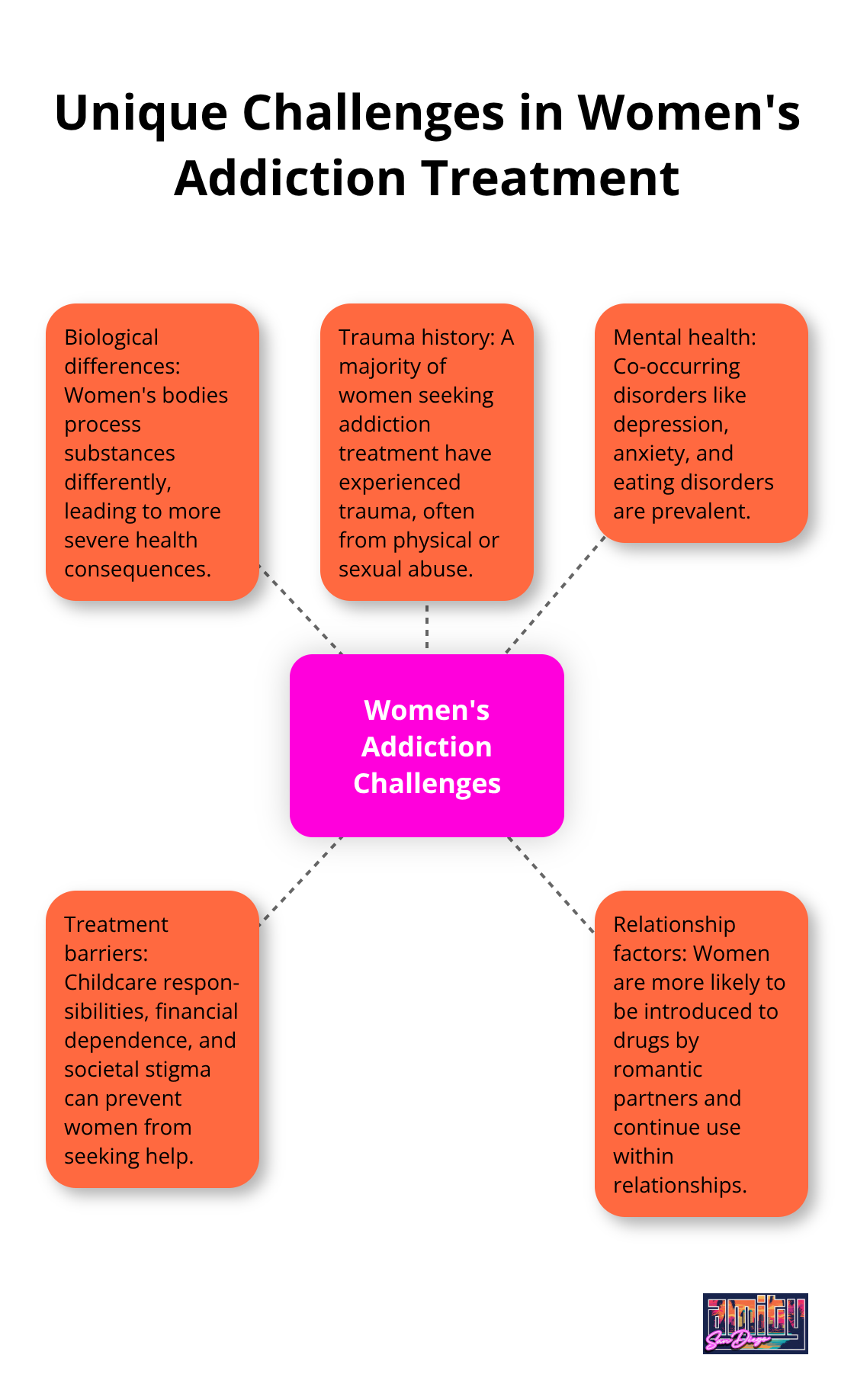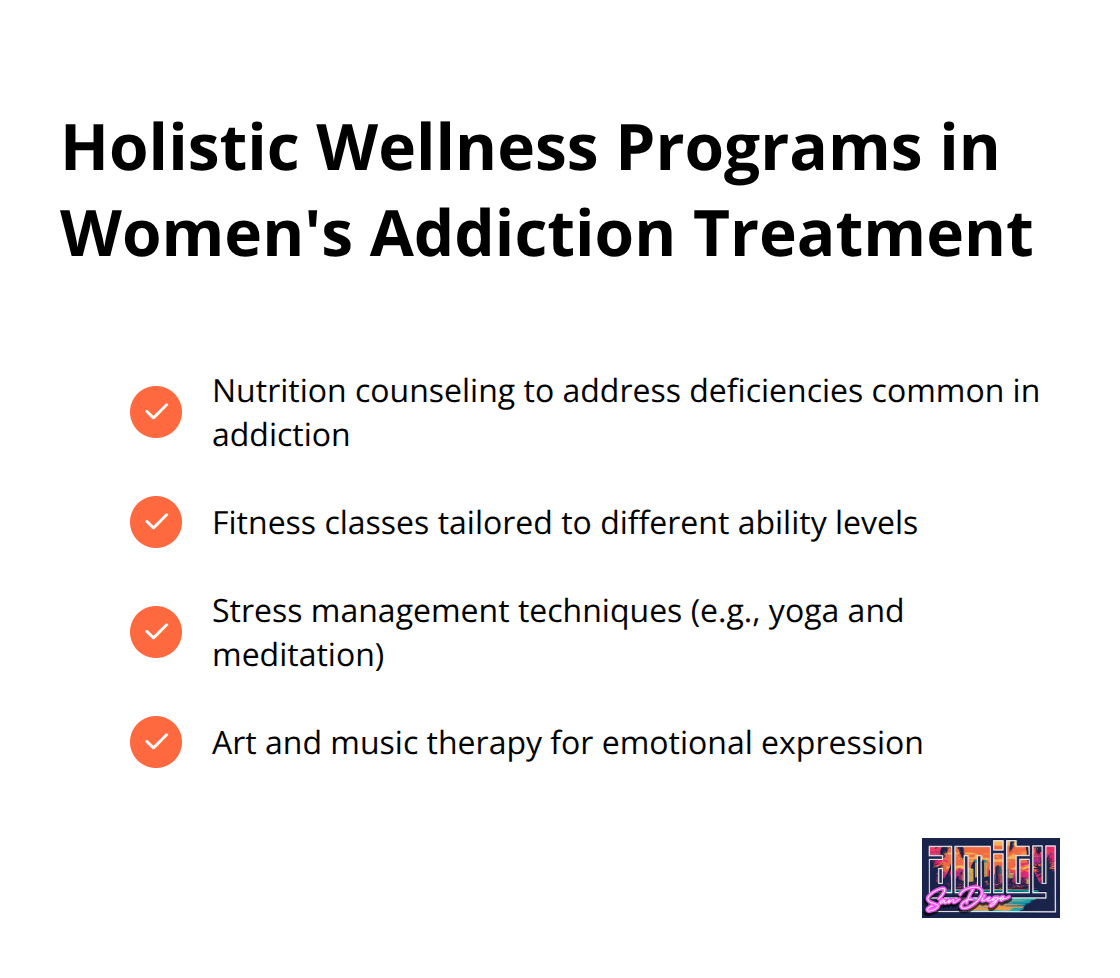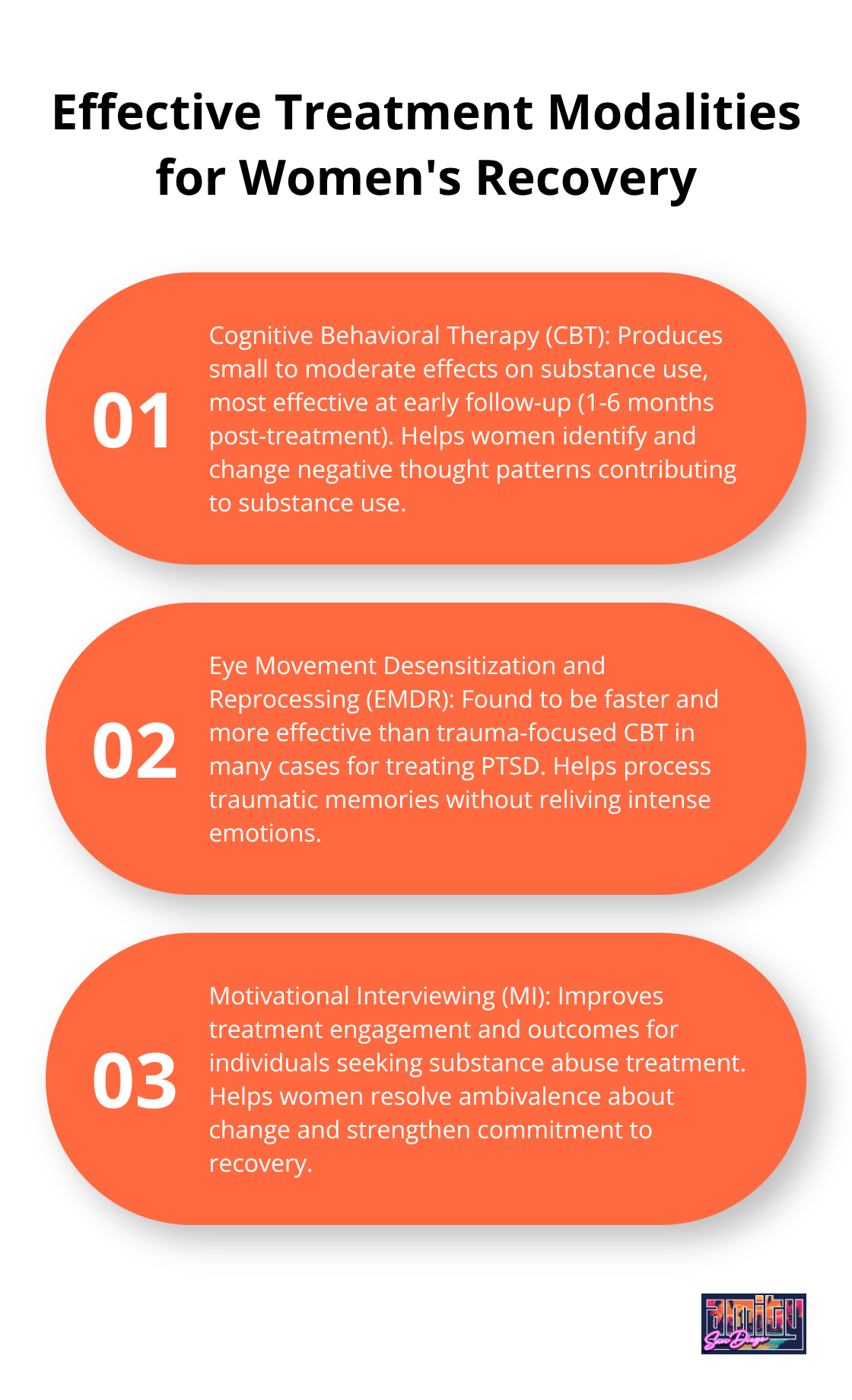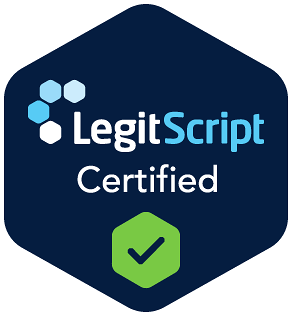Women’s substance abuse treatment programs require a unique approach that addresses the specific challenges faced by women in addiction. At Amity San Diego, we understand that biological differences, trauma, and societal pressures all play crucial roles in women’s addiction and recovery journeys.
Our tailored solutions focus on providing comprehensive care that goes beyond traditional treatment methods. By incorporating gender-specific therapy, trauma-informed care, and holistic wellness programs, we empower women to overcome addiction and build fulfilling lives in recovery.
Why Women Need Specialized Addiction Treatment
The Biology of Addiction in Women
Women’s bodies process substances differently than men’s. Women typically have a higher body fat percentage and lower water content, which affects how alcohol metabolizes. This results in more severe health consequences from substance use, even when women consume smaller amounts over shorter periods.
The National Institute on Drug Abuse reports that women progress from first use to addiction more quickly than men (a phenomenon known as telescoping). This rapid progression underscores the urgency of early intervention and specialized treatment for women.
Trauma and Relationships: Key Factors in Women’s Addiction
Trauma plays a significant role in women’s substance use disorders. Studies show that a majority of women seeking treatment for addiction have a history of trauma, often stemming from physical or sexual abuse. Trauma-informed care must integrate into treatment programs to address these underlying issues that fuel addiction.
Relationships also heavily influence women’s substance use patterns. Women are more likely than men to be introduced to drugs by a romantic partner and to continue using as part of that relationship. Programs must focus on building healthy relationships and setting boundaries as essential components of recovery.
Mental Health and Addiction: A Complex Interplay
Co-occurring mental health disorders are common among women with substance use issues. The Substance Abuse and Mental Health Services Administration reports on substance use, mental health, and treatment in the United States. Depression, anxiety, and eating disorders are particularly prevalent.
A dual diagnosis approach ensures that both addiction and mental health concerns receive treatment simultaneously, providing a more comprehensive path to recovery.
Breaking Down Barriers to Treatment
Women often face unique obstacles when seeking addiction treatment. Childcare responsibilities, fear of losing custody, and financial dependence on a partner can all prevent women from getting the help they need. Additionally, societal stigma surrounding women’s substance use can lead to feelings of shame and reluctance to seek treatment.
To address these barriers, treatment centers must offer flexible options and provide resources for childcare and family support. Programs should empower women, helping them overcome stigma and build the confidence needed for long-term recovery.

Tailored Treatment Approaches
Effective women’s addiction treatment programs incorporate gender-specific therapy, trauma-informed care, and holistic wellness approaches. These may include:
- Cognitive Behavioral Therapy (CBT) for addiction and co-occurring disorders
- Dialectical Behavior Therapy (DBT) for emotional regulation
- Eye Movement Desensitization and Reprocessing (EMDR) for trauma processing
- Motivational Interviewing to enhance treatment engagement
The next chapter will explore these specialized treatment modalities in greater detail, examining how they address the unique needs of women in recovery.
What Makes Women’s Addiction Treatment Effective?
At Amity San Diego, we’ve witnessed how tailored approaches improve outcomes for women in recovery. Our programs address the unique challenges women face, from biological differences to societal pressures.
Gender-Specific Support: A Safe Space for Healing
Women-only therapy groups create a secure environment for discussing sensitive topics like motherhood, body image, and past trauma. In these settings, women open up about their experiences without fear of judgment. Research has shown that characteristics associated with treatment outcomes in women with substance use disorders are unique and require specialized approaches.
Our gender-specific groups focus on issues particularly relevant to women, such as:
- Coping with societal expectations and pressures
- Addressing relationship dynamics and codependency
- Building self-esteem and assertiveness skills
- Navigating the challenges of balancing recovery with family responsibilities
Trauma-Informed Care: Addressing the Root Causes
The high prevalence of trauma among women with substance use disorders makes trauma-informed care essential. This approach recognizes the impact of past experiences on current behaviors and provides tools for healing.
Recent studies have examined the contribution of trauma-informed care to knowledge in the field of trauma and addictions, inspiring community treatment programs.
We use evidence-based therapies to help women process traumatic memories. We also incorporate mindfulness techniques and body-based therapies to address the physical manifestations of trauma.
Family Therapy: Strengthening Support Systems
Family dynamics play a vital role in women’s recovery. Our family therapy sessions help repair damaged relationships and build a strong support system. We educate family members about addiction and teach communication skills that foster healing for everyone involved.
For mothers in treatment, we offer parenting classes and support groups. These resources help women balance their recovery with the demands of motherhood, reducing the guilt and stress that can trigger relapse.

Holistic Wellness: Nurturing Body and Mind
Recovery extends beyond abstaining from substances; it involves creating a fulfilling, balanced life. Our holistic wellness programs include:
- Nutrition counseling to address deficiencies common in addiction
- Fitness classes tailored to different ability levels
- Stress management techniques (e.g., yoga and meditation)
- Art and music therapy for emotional expression
Recent research suggests that incorporating nutrition and exercise into daily habits can significantly enhance mental and physical well-being in addiction recovery.
Vocational Training: Empowering Independence
Many women in recovery face financial challenges or gaps in employment history. Our vocational training programs provide practical skills for re-entering the workforce or pursuing education. We offer resume writing workshops, interview practice, and connections to local employers who support recovery.
The next chapter will explore specialized treatment modalities in greater detail, examining how they address the unique needs of women in recovery.
Effective Treatment Modalities for Women’s Recovery
At Amity San Diego, we utilize a range of evidence-based therapies tailored specifically for women’s needs in addiction recovery. Our approach combines proven psychological interventions with holistic practices to address the complex factors underlying substance use disorders in women.
Cognitive Behavioral Therapy: Rewiring Thought Patterns
Cognitive Behavioral Therapy (CBT) forms the cornerstone of our treatment program. This method helps women identify and change negative thought patterns that contribute to substance use. CBT has been shown to produce small to moderate effects on substance use when compared to inactive treatment and is most effective at early follow-up (1–6 months post-treatment).
Dialectical Behavior Therapy: Mastering Emotional Regulation
For women who struggle with emotional dysregulation (often stemming from trauma or co-occurring disorders), Dialectical Behavior Therapy (DBT) proves invaluable. DBT teaches critical skills in four key areas:
- Mindfulness: Staying present and aware
- Distress tolerance: Coping with difficult emotions without turning to substances
- Emotion regulation: Understanding and managing intense feelings
- Interpersonal effectiveness: Communicating needs and setting boundaries
EMDR: Processing Trauma for Lasting Recovery
Eye Movement Desensitization and Reprocessing (EMDR) therapy addresses the trauma often underlying women’s substance use. This innovative approach helps clients process traumatic memories without reliving the intense emotions associated with them. Studies have found EMDR to be a faster and more effective treatment of PTSD than trauma-focused CBT in many cases.
Motivational Interviewing: Enhancing Readiness for Change
Motivational Interviewing (MI) is a client-centered approach that helps women resolve ambivalence about change and strengthen their commitment to recovery. Research has shown that MI can improve treatment engagement and outcome in individuals seeking treatment for substance abuse.

These specialized modalities, combined with our gender-specific approach, create a comprehensive treatment experience that addresses the unique challenges women face in addiction recovery. Our goal is not just to help women achieve sobriety, but to empower them to build fulfilling, purposeful lives free from addiction.
Final Thoughts
Women’s substance abuse treatment programs have evolved to address the unique challenges women face in recovery. These programs recognize the impact of biological differences, trauma histories, and societal pressures on women’s addiction experiences. At Amity San Diego, we provide comprehensive care that extends beyond substance use to foster deeper healing and sustainable recovery outcomes.
Our gender-specific approach creates a safe environment for women to discuss sensitive issues without judgment. We integrate trauma-focused therapies, life skills development, and holistic wellness practices to empower women in their recovery journey. Our programs also offer vocational training and parenting support to equip women with essential resources for building fulfilling lives post-treatment.
The field of addiction treatment continues to advance, and women’s substance abuse treatment programs must adapt to meet evolving needs. We combine evidence-based therapies with gender-specific support to provide women the best possible chance at lasting recovery. Our goal is not just to help women achieve sobriety, but to empower them to create purposeful lives free from addiction.



